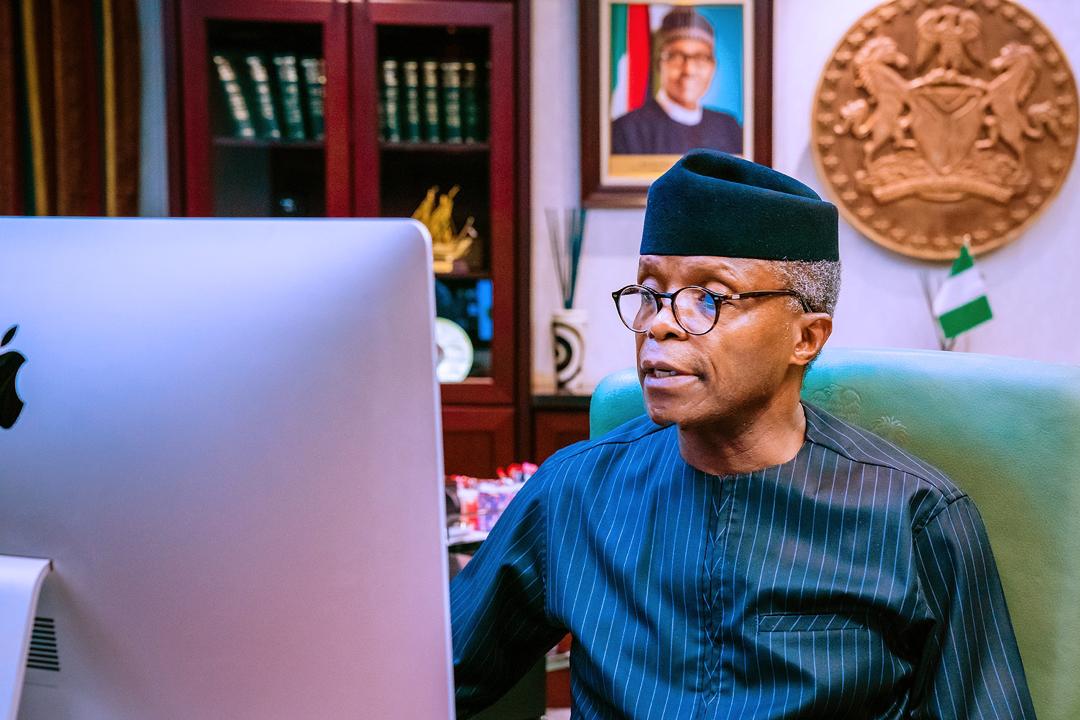US – Nigerian Council & Milken Institute Event Themed: Leveraging Technology During & After The COVID-19 Pandemic
KEYNOTE ADDRESS BY PROF. YEMI OSINBAJO, SAN, GCON, VICE-PRESIDENT OF THE FEDERAL REPUBLIC OF NIGERIA AT US – NIGERIAN COUNCIL AND MILKEN INSTITUTE EVENT THEMED: LEVERAGING TECHNOLOGY DURING AND AFTER THE COVID-19 PANDEMIC THE 10TH OF SEPTEMBER, 2020
It is a pleasure to be here today at this roundtable hosted by the US-Nigeria Council and the Milken Institute. When the WHO declared COVID-19 a pandemic last March, no one was certain what it meant for all our lives. Today, one thing has become certain, our lives have been disrupted in many ways and the use of virtual roundtables such as this one has become the new normal.
In our domestic context, the Presidential Task Force on COVID-19, set up to coordinate government responses to the pandemic, has leveraged technology in its responses working with private companies. One of them, Flying Doctors, helped to build two testing centres and three laboratories in Lagos, and they also invented a testing booth and mobile test vehicle to make testing cheaper and keep healthcare workers safe.
Nigeria’s response to the socio-economic impact of COVID-19 is to mitigate its effects on the most vulnerable, protect and create jobs and rescue businesses. These interventions are contained in our Economic Sustainability Plan which has a section on technology entitled ‘The Future of Work’. The part of the plan focuses on the role of technology in rejigging the economy by providing relevant skills, the building of call centres, robotic laboratories, and support for technology entrepreneurs.
There are several other ways in which Nigeria has deployed technology in the COVID-19 era.
We have made active use of digital platforms including social media to sensitize our people to the dangers of COVID-19 and the sharing of protocols about maintaining hygiene, keeping safe and maintaining social distancing. Similarly, our testing protocols require that the transmission of test results be sent confidentially and electronically by text messages or e-mails.
We are also ramping up our digital ID scheme as it became apparent at the height of our lockdown that we did not have a robust enough database on which to provide immediate support to the worst affected parts of the populace. We are adopting an approach similar to the Indian Aadhaar model, aiming to provide all Nigerians with a unique digital National Identity Number by leveraging the existing enrolment facilities of agencies that issue passports, drivers’ licences, bank verification numbers, and voters registers. So far, we have increased the record of Nigerians in the central identity database from 7 million to more than 37 million.
Using our existing databases and digital platforms, we were nevertheless able to make cash transfers to an additional one million households during the COVID-19 lockdown in the country.
The ‘Food for All’ agricultural programme in our Economic Sustainability Plan has used Global Positioning Systems (GPS) technology to map over 5 million farmers and tie them to their land. Apart from enabling their inclusion in the programme, GPS mapping has enabled easier arrangement of outgrown schemes, and the provision of credit and extension services.
LifeBank launched Quip, a national asset register that locates critical equipment (respirators, ventilators, ICU beds) and makes them available to hospitals and these was deployed for treatment and management of COVID-19. LifeBank serves 1252 hospitals and health facilities and has moved over 25262 products since 2016. This service has proved very useful during the pandemic.
We need no convincing about the need to move beyond being consumers and to also become producers and creators of digital technologies and content which is why we deliberately designed a technological response to the pandemic including the upgrading of digital infrastructure and increasing access to broadband facilities.
In sum, we must ride the wave of technological change to thrive in and even survive in the coming era. We must design a policy with this technological future in mind and be able to embrace it and its benefits. The COVID-19 crisis has created an opportunity to reset and prepare our countries for the 4th industrial revolution which is already here. Our future generations will thank us for it.
Thank you for listening.


